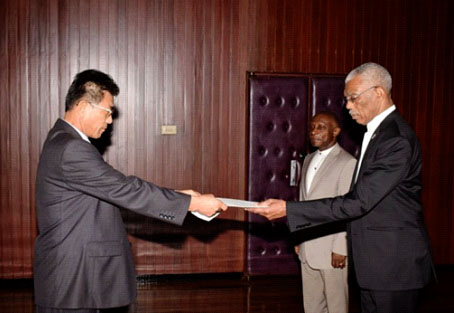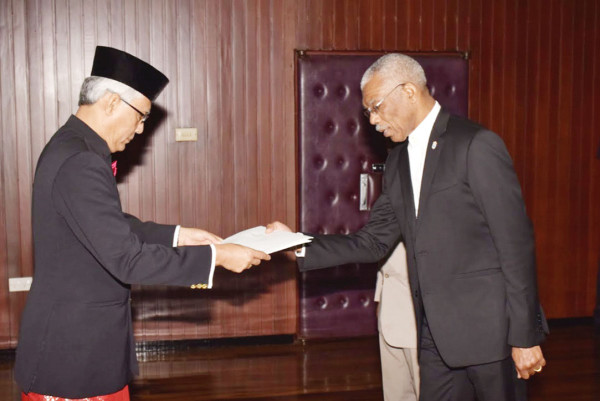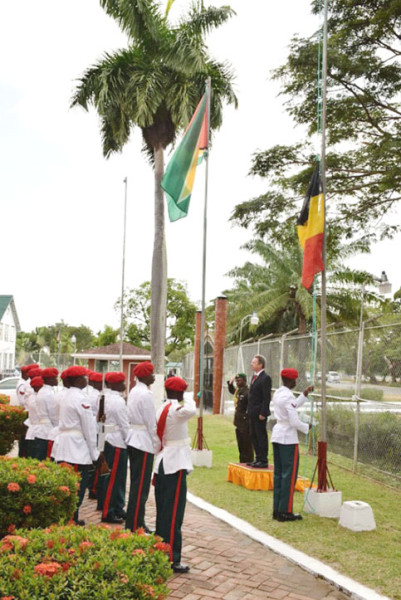President David Granger on Thursday accredited four new non-resident Ambassadors to Guyana.
At separate ceremonies held at the Ministry of the Presidency, letters of credence were presented to President Granger by Dominicus Supratikto of the Republic of Indonesia, Guy Sevrin, of the Kingdom of Belgium, Nguygen Van Kien, of the Socialist Republic of Vietnam and Pak Chang Yul, of the Democratic People’s Republic of Korea.
According to a Government Information Agency (GINA) report, Granger, in welcoming the Indonesian Ambassador, noted that despite the distance that separates the two nations, they share common interests, goals and aspirations in relation to the reduction of poverty, opposition to all forms of terrorism and combating climate change.
He added that Guyana hopes to work with the new Ambassador to ensure that global solutions are found to the problems of developing nations, including problems that affect the security and survival of small states.
“Guyana anticipates progress will be made towards achieving a globally-binding agreement at the upcoming 21st Conference of Parties to the United Nations Framework Convention on Climate Change in Paris, in December, 2015,” he was quoted as saying.
Ambassador Supratikto expressed his hope that the relationship and cooperation between the two countries will be increased based on mutual respect and friendly relations.
Guyana and Indonesia formally established diplomatic relations on August 27th, 1999, although both countries had previously been involved in engagements within the Non-Aligned Movement.
GINA reported that in accepting the letters of credence from the new Belgium Ambassador, Granger highlighted Brussels’s experience in pursuing the peaceful resolution of conflicts through legal mechanisms as it has consistently sought juridical settlements to its disputes with other countries, particularly through the International Court of Justice.
He noted the invaluable role it can play in assisting Guyana as it pursues the objective of a juridical settlement to a controversy arising out of threats to its sovereignty and territorial integrity—a clear reference to the ongoing border controversy with Venezuela.
Additionally, Granger remarked that there remains great scope for the strengthening and deepening of relations between Guyana and Belgium, particularly in the areas of economic and commercial cooperation as well as in advancing common interests within international organisations.
Guyana established diplomatic relations with the Kingdom of Belgium on June 10, 1971.
Meanwhile, Granger also congratulated the new Vietnamese Ambassador on his appointment, while noting that diplomatic ties between Guyana and Vietnam were established on April 19th, 1975, a time when many small states were still fighting for their right to self-determination.
He added that both countries have since pursued relations based on the principles of mutual respect for each other’s independence, equality and co-operation for mutual benefit.
More importantly, Granger highlighted that both Guyana and Vietnam are vulnerable to the adverse effects of global warming and climate change. “We have a common interest, therefore, in working together with other nations to find a solution to this existential threat,” he said.
And as such, “Guyana looks forward to cooperating with Vietnam to promote the achievement of a global agreement that takes cognizance of the vulnerabilities of states to vulnerabilities to climate-induced shocks.”
In accepting Ambassador Pak’s letters of credence, the President highlighted several visits made to The Democratic People’s Republic of Korea by Guyana’s first president, Arthur Chung, and the first Prime Minister, Forbes Burnham. According to Granger, it was these visits that led to a number of cooperation agreements as well as to the establishment of close ties between the two countries.
Additionally, he highlighted that as a part of the Non- Aligned Movement, both Guyana and North Korea remain committed to the principle of mutual non-aggression, mutual non-interference in each other’s internal affairs, mutual respect for each other’s territorial integrity and equality and co-operation for mutual benefit.
“The Cooperative Republic of Guyana and the Democratic People’s Republic of Korea remain steadfast in their adherence to the precept of peaceful co-existence amongst states,” Granger said.
Guyana and North Korea established diplomatic relations on May 18th, 1974.







